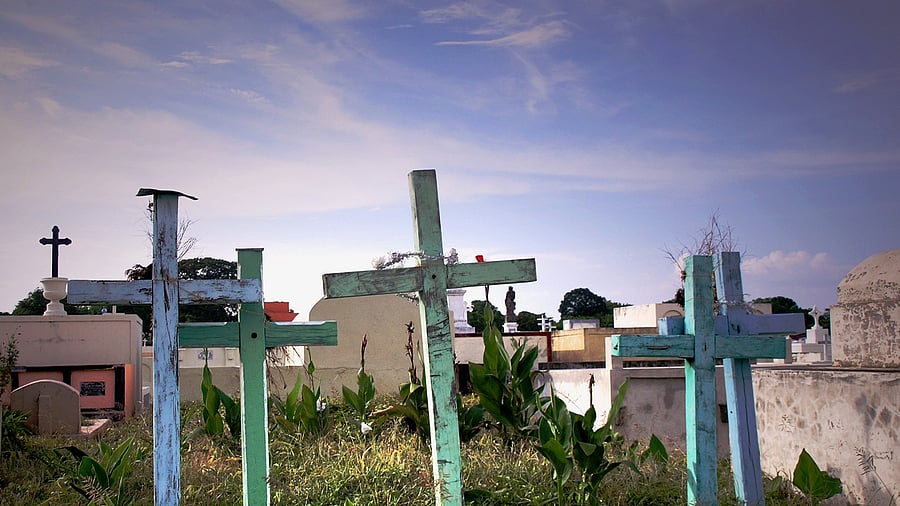
A Christian burial ground. (Representative image)
Credit: iStock Photo
New Delhi: The Supreme Court on Wednesday favoured for an amicable solution to a plea by a man seeking burial of his pastor father whose body has been lying in the mortuary since January 7, in view of opposition by Hindu tribals in his village in Chhattisgarh.
A bench of Justices B V Nagarathna and Satish Chandra Sharma expressed surprise over the sudden objection of the Hindu tribals, observing that for years nobody raised objections to the burials of persons from both communities together.
“Until this incident, there was no opposition.. why suddenly?” the bench asked, while hearing the plea of Ramesh Baghel, who challenged an order of the Chhattisgarh High Court, which disposed of his plea seeking burial of his father in the area specified for Christian burials in his village graveyard.
The bench said there could be a designated place for burial inside the village.
Solicitor General Tushar Mehta, representing the Chhattisgarh government, submitted the village burial ground where the petitioner wanted to bury his father, was exclusively for tribal Hindu persons and not for Christians.
Another counsel said that this issue is arising in multiple villages in the Bastar area.
Mehta said that even during earlier governments, this has been objected to throughout the state.
"You must understand that the petitioner's father has been in morgue since January 7. Now, it is not just a decent burial for a person who is dead. We want an amicable settlement and a decent burial. We want that there should be an amicable solution to this problem. We do not want to escalate it," the bench said.
Mehta said there are several villages where the number of Hindu population is less therefore there is no separate village-wise Hindu crematorium.
He said burial should take place in the designated area for the Christian tribals which was located about 20 kilometres away from the family's Chhindawada village.
"We will take the dead body in our ambulance with police protection. We will provide all logistics support. Let this not become the beginning of a huge public order issue in the state," he said.
Appearing for the petitioner, senior advocate Colin Gonsalves said the state's affidavit claiming it was a tradition for Christian tribals to go outside the village for burial, was a lie.
Relying upon record revenue maps of the village, he claimed that there were many cases in which the community members were buried in the village itself.
The court reserved its verdict in the matter.
Relying upon a certificate issued by the gram panchayat's sarpanch, the High Court noted that there were no separate burial grounds for Christians. It declined a permission for burial, observing it could cause unrest and disharmony among the public at large.
The petitioner claimed Chhindawada village had a graveyard which was verbally allotted by the gram panchayat for burial and cremation of bodies.
In the graveyard, separate areas were demarcated for burial of tribals; burial or cremation of people belonging to Hindu religion and for persons belonging to the Christian community, it said.
